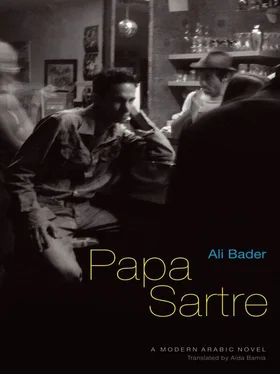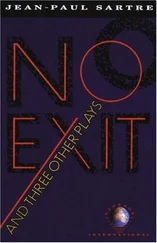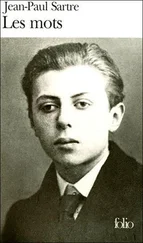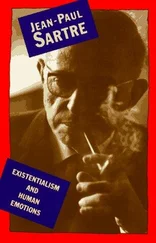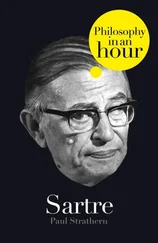Despite her very modest education, the girl he befriended was not fooled by his declarations. She had vast experience in life. She could not believe that a person who devoured life as he did would experience what the foolish philosophers were calling nausea. But she pretended to believe him and his philosophy, his madness and his stupidities. Sometimes at the end of their lovemaking, as she slipped out of bed and put on her bright red slip, she would admit to feeling funny. She described it as a strange feeling, something she never experienced before, something like nausea.
Abd al-Rahman returned to Baghdad for good in the early sixties, accompanied by his French wife and justifying his life as a philosopher without a degree. He was warmly welcomed and supported by his country’s intellectuals, to whom he declared that it did not make sense to have a degree in a senseless world, a phrase that became famous. Someone in his entourage would speculate, “With or without a degree, was Sartre a philosopher?” This scene had taken place on a very hot summer evening his first year home from Paris. He was at the Café Brazil with Salman al-Safi and Abbas Philosophy. The two men got very excited, overturned their chairs, and shouted their approval of this extraordinary philosophical phrase. The philosopher moved them deeply with his appearance and intoxicated them with his philosophical features.
Abbas Philosophy and Salman became the most important intellectuals of the sixties. Abbas came to Baghdad from Kirkuk, after a career in the petroleum industry, to start his career as a poet. Because rhymed poetry posed a problem for him, he championed free verse and followed in the footsteps of an entire generation. At that time he used to call Sartre “Kaka Sartre.” Salman came from al-Shatra, with a small sum of money, to study at Baghdad University. He was like many country people who move to the city, dark-skinned and timid, motivated by dreams of relationships with the most beautiful girls in town, chosen from the bourgeoisie to overcome a psychological gap. If they failed to establish such a relation due to their inexperience, gaucherie, and lack of qualifications, they would invent one in their imaginations and nourish their dreams with love disputes, neurotic fights, tears, and submission. Once those delusions thinned, they’d encounter reality and run away, accusing the girl — to whom they had never spoken — of betrayal and deception and accuse her family of committing social discrimination, and of having a disgusting bourgeois mentality and sickening aristocratic airs.
Salman left the university and found a job as an assistant tailor in Hassoun al-Hindi’s boutique on al-Rashid Street, near al-Zawraa cinema. He planned to devote time to writing a major novel condemning the feudal system in the Muntafik brigade.
The young Iraqi intellectuals celebrated the great philosophy of existentialism, the subject of articles by Suhail Idris in al-Adab journal since the fifties and by Abd al-Rahman Badawi in al-Katib al-‘arabi since the forties. Iraqi intellectuals became acquainted with that philosophy after the Second World War in the Waqwaq café, near the Olympic Club in Antar Square. Abd al-Rahman returned from Paris in the sixties and told Iraqis about his personal experiences and what he had learned of that philosophy. He rented an elegant house for his French wife in Mahallet al-Sadriya and became the uncontested existential philosopher. He was renowned in the Arab World and even received an invitation from Suhail Idris to write articles on existentialism for al-Adab , the most famous Arab existentialist journal of the time. I never found the letter sent by Idris and also signed by his wife Aida among the manuscripts I have, though when I met them at the restaurant in al-Camp both Salman and Abbas assured me that they had read the letter. Abd al-Rahman arrogantly declined Suhail Idris’s invitation on the grounds that his philosophical thinking occurred in French and he was unable to translate it into Arabic.
The truth is that Abd al-Rahman was unable to write in French or Arabic. His thinking was disorganized, and he was unable to express his feelings in either language. His education was superficial and not derived from books. It was the same education that characterized most of the intellectuals of his generation; it consisted of hours in the morning spent talking, playing dominos, and smoking a water pipe at the café, going to the movies in the afternoon to stretch lazily on the comfortable chairs, and spending evenings drinking and gambling in bars. They only knew the titles of books and what had been written in newspaper reviews. With words they built up kingdoms and knocked down others, ruined reputations, while in their own lives they were unable to carry out what they planned, change their realities, or even comprehend their own environment.
Abd al-Rahman’s argument against writing was, in fact, quite valid, an existentially reasonable argument. He claimed that whoever writes finds something worthwhile, a meaningful life, and expects some financial reward. “How could I then go on believing in a meaningless world?” he would ask. People hailed this concept, and a whole generation of intellectuals did not write because they didn’t want to be part of this false, deceptive world, they didn’t want to be cheated, they didn’t want to be part of the complex imposed by colonialism, reactionaries, and the ungrateful.
The truth was totally different. Abd al-Rahman was unable to spend hours sitting at a desk to write or even to lie on his stomach on the floor. On the other hand, he liked reading because reading was like dreaming. He used to go over the first few lines of a text and forget the world around him, totally lost in his thoughts. He would start pacing back and forth in his room, get dressed, and roam aimlessly in the streets of the city, dreaming of the words he had read or of the words he intended to say.
Abd al-Rahman found talking to be both soothing and entertaining. Conversation kept him company and pleased him because words, as most of his companions discovered, are like thoughts in their potential to signify meaning. They conform to every aspect of awareness. This is so because the speaker begins the process of thinking the instant he utters a word. At that moment he’s enthusiastic and powerful — or perhaps he is a doubter or denier. Writing is different, a distinct form, far removed from spoken words. It distances itself from emotional reactions. It’s like masturbation. It represents a feel for the image but not the image itself, while spoken words are, at the very least, an agreement between the image and the object, between the moment and the reaction, the thought and the soul. When Abd al-Rahman speaks, he allows his words to float freely while he feels a kind of purification or numbness. The words he utters and the feelings he experiences evaporate. Thoughts that struggle in his mind fly away. This is how Abd al-Rahman used to talk, because spoken words offered him a true nihilism, not an approximation, a realistic philosophy rather than figurative thinking. In short, Abd al-Rahman was a speaker not a writer; he was a philosopher not a scoundrel.
Ismail Hadoub asked him one day, “What about Sartre? Why does he write?” and closed his eyes to await the philosopher’s response. Abd al-Rahman replied, also with closed eyes, and like a prophet, and said, “Sartre is one thing and we are something else. What is given to Sartre is not given to anyone else. Sartre writes to have his books translated into Arabic so that we may read them. Otherwise, pray tell, if Sartre did not write, how could we have heard of him? Sartre is something else,” he said as he was walking with Ismail Hadoub on a very cold winter night, down al-Rashid Street near the Haydar Khana mosque. They were soon joined by the turbaned men who emerged from the large wooden gates of the mosque. They crowded the narrow sidewalk near the metal ramp, decorated with Islamic designs and blue enamel. Abd al-Rahman crossed to the other side of the street once he spotted this swarm of white turbans, gray waistcoats, and black gowns. They all looked alike: each with a Quran and prayer beads in hand, with beards and quick, self-confident steps and stern looks. No sooner did they step down from the sidewalk, however, than a small black carriage pulled by two white horses stopped in front of them; a lady wearing the traditional burqa and black abaya stepped out. Abd al-Rahman and Ismail hired the carriage for a ride across the city before going to Dalal Masabni’s Grief Adab nightclub near the Roxy cinema.
Читать дальше
